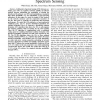Free Online Productivity Tools
i2Speak
i2Symbol
i2OCR
iTex2Img
iWeb2Print
iWeb2Shot
i2Type
iPdf2Split
iPdf2Merge
i2Bopomofo
i2Arabic
i2Style
i2Image
i2PDF
iLatex2Rtf
Sci2ools
CORR
2010
Springer
2010
Springer
Coalition Formation Games for Collaborative Spectrum Sensing
Abstract--Collaborative Spectrum Sensing (CSS) between secondary users (SUs) in cognitive networks exhibits an inherent tradeoff between minimizing the probability of missing the detection of the primary user (PU) and maintaining a reasonable false alarm probability (e.g., for maintaining a good spectrum utilization). In this paper, we study the impact of this tradeoff on the network structure and the cooperative incentives of the SUs that seek to cooperate for improving their detection performance. We model the CSS problem as a non-transferable coalitional game, and we propose distributed algorithms for coalition formation. First, we construct a distributed coalition formation (CF) algorithm that allows the SUs to self-organize into disjoint coalitions while accounting for the CSS tradeoff. Then, the CF algorithm is complemented with a coalitional voting game for enabling distributed coalition formation with detection probability guarantees (CF-PD) when required by the PU. The CF-PD a...
| Added | 09 Dec 2010 |
| Updated | 09 Dec 2010 |
| Type | Journal |
| Year | 2010 |
| Where | CORR |
| Authors | Walid Saad, Zhu Han, Tamer Basar, Mérouane Debbah, Are Hjørungnes |
Comments (0)

